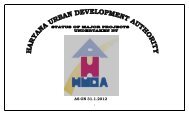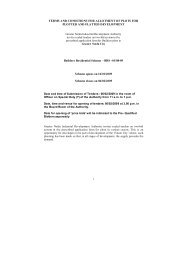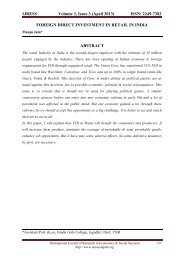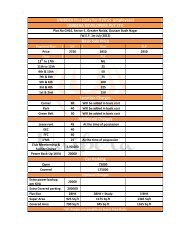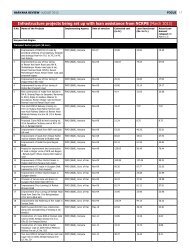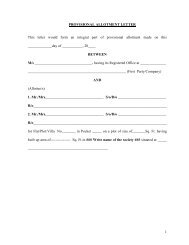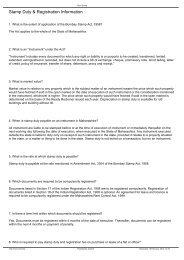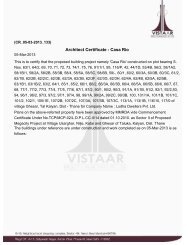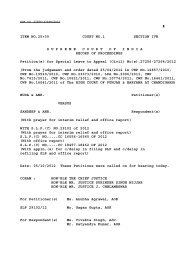eLegalix - Allahabad High Court Judgment Information System ...
eLegalix - Allahabad High Court Judgment Information System ...
eLegalix - Allahabad High Court Judgment Information System ...
You also want an ePaper? Increase the reach of your titles
YUMPU automatically turns print PDFs into web optimized ePapers that Google loves.
JUDGMENT/ORDER IN - WRIT - C No. 37443 of 2011 at <strong>Allahabad</strong> Dated-21.10....http://elegalix.allahabadhighcourt.in/elegalix/WebShow<strong>Judgment</strong>.doPage 137 of 19710/21/2011upon which the Commissioner could be so satisfied, a court might infer either that he did not honestly form thatview or that in forming it he could not have applied his mind to the relevant facts."The ratio which is culled out from the aforesaid case is that the opinion of the State Government under Section 17(4) can be challenged in a court of law if it could be shown- (a) that the State Government never applied its mindto the matter, (b) or that the action of the State Government was malafide, (c) or that there were no ground uponwhich the State Government could form such an opinion, (d) or that in forming such opinion it did not apply itsmind to the relevant facts. In the aforesaid case the Apex <strong>Court</strong> held that forming of opinion under Section 17(4)was erroneous. The Apex <strong>Court</strong> laid down following in paragraphs 22 and 23 of the said judgment:-"22. For the reasons already expressed we hold that the State, Government has no jurisdiction to apply theprovisions of s. 17 (1) and (4) of the Act to the land in dispute and to order that the provisions of s. 5A of the Actwill not apply to the land. We are further of the opinion that the State Government had no jurisdiction to order theCollector of Mirzapur to take over possession of the land under s. 17(1) of the Act. The notification dated October4, 1950 is therefore illegal. For the same reasons the notification of the State Government under s. 6 of the Act,dated October 12, 1950 is ultra vires.23. We accordingly hold that a writ in the nature of certiorari should be granted quashing the notification of theState Government dated October 4, 1950 by which the Governor has applied s. 17(1) and (4) to the land indispute and directed that the provisions of s. 5A of the Act should not apply to the land. We further order that thenotification of the State Government dated October 12, 1950 under s. 6 of the Act and also further proceedingstaken in the land acquisition case after the issue of the notification should be quashed including the award datedJanuary 7, 1952 and the reference made to civil <strong>Court</strong> under s. 18 of the Act."The Apex <strong>Court</strong> in the case of Nadeshwar Prasad vs. U.P. Government and others (three Judge Bench) reportedin A.I.R. 1964 SC 1217 had laid down that it is not necessary that even where the Government makes a directionunder Section 17(1) that it should also make a direction under Section 17(4). Following was observed inparagraph 11:-"11. ..... It will be seen that it is not necessary even where the Government makes a direction under S. 17(1) that itshould also make a direction under S. 17(4)......"The Apex <strong>Court</strong> in the aforesaid case further laid down that right to file objection under Section 5A of the Act is asubstantial right. Following was laid down in paragraph 13:-"13. .... The right to file objection under S. 5-A is a substantial right when a person's property is being threatenedwith acquisition and we cannot accept that that right can be taken away as if by a side-wind ......"A three Judge Bench in the case of Narayan Govind Gavate vs. State of Maharashtra reported in 1977 S.C. 183has elaborately considered the ambit and scope of Section 17 of the Act. The Apex <strong>Court</strong> also considered thescope of judicial review of the opinion formed by the State Government under Section 17(4). Following was laiddown in paragraph 10 of the said judgment:-"10. It is true that, in such cases, the formation of an opinion is a subjective matter, as held by this <strong>Court</strong>repeatedly with regard to situations in which administrative authorities have to form certain opinions before takingactions they are empowered to take. They are expected to know better the difference between a right or wrongopinion than <strong>Court</strong>s could ordinarily on such matters. Nevertheless, that opinion has to be based upon somerelevant materials in order to pass the test which <strong>Court</strong>s do impose. That test basically is: was the authorityconcerned acting within the scope of its powers or in the sphere where its opinion and discretion must bepermitted to have full play? Once the <strong>Court</strong> comes to the conclusion that the authority concerned was actingwithin the scope of its powers and had some material, however meagre, on which it could reasonably base itsopinion, the <strong>Court</strong>s should not and will not interfere. There might, however, be cases in which the power isexercised in such an obviously arbitrary or perverse fashion, without regard to the actual and undeniable facts, or,in other words, so unreasonably as to leave no doubt whatsoever in the mind of a <strong>Court</strong> that there has been anexcess of power. There may also be cases where the mind of the authority concerned has not been applied at all,due to misunderstanding of the law or some other reason, what was legally imperative for it to consider."The Apex <strong>Court</strong> in the aforesaid case further laid down that the mind of the Officer or authority concerned has tobe applied to the question whether there is an urgency of such nature that even the summary proceedings underSection 5A of the Act should be eliminated. Followings were laid down by the Apex <strong>Court</strong> in paragraphs 38, 40, 41and 42 of the said judgment:-



